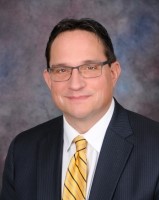 Eric Borgerding, WHA President and CEO
Eric Borgerding, WHA President and CEO
On this day (12/29) a year ago, there were exactly 1,800 Wisconsin COVID hospitalizations on the spiking
WHA COVID dashboard, on our way to a new record of 2,391 hospitalizations
just fourteen days later. We were in the throes of a second major COVID surge, this time hampered by the compounding damage of a pandemic then nearly two years long. Those months in late 2021/early 2022 were a blur, but the hours and days standing with our members remain crystal clear.
Hospitalizations again stabilized but with respite seemingly in sight, new realities settled in. Preexisting problems had been exacerbated, their impacts expedited, and the pandemic’s damage was not going away. There’d be no exhale, no return to “normal” especially in acute and long-term care settings where obligations and expectations were shifting rapidly.
The hospital version of “long COVID” – shortages of and demands on our workforce; inflated costs of
delivering health care; pressures on reimbursement straining operations; and the eroding ability or willingness of government to meet its obligations – remains very challenging. But with engagement from our members, reliance on strong partnerships and a discerning team at WHA, together we are realizing lessons from COVID and leveraging its unexpected opportunities.
COVID pulled the curtains back on so many elements of health care begging for reform. To be sure, the state and federal governments were critical allies during the past 32 months, resources from both much appreciated lifelines. But sometimes the most helpful thing government can do is allow itself to get out of the way. Necessity is the mother of invention, and so are generational pandemics! Indeed, COVID has been a giant pilot program opening the door for a host of pandemic-borne, yet overdue, regulatory reforms driven by the needs and experiences of our members and translated into action by the unparalleled WHA team.
Working together this past year we took on issues like workforce, licensure, long-term care, cost, violence against health care workers, capacity, emergency response, and stifling red tape that complicates the connection between patient and provider. And all within a (still) politically tumultuous, blame-shifting environment that some on the cyber sidelines will perpetuate and exploit in 2023.
In the coming year, WHA will again be well-served by our proven approach to advocacy, which leans very heavily on informed public policymaking and skillful political navigation. “I appreciate what WHA does, and you will never be more important than this next legislative session,” Assembly Speaker Robin Vos told the WHA board of directors in October.
We curate long-standing partnerships while leveraging those COVID lessons to guide and deliver important, sometimes critical, health care policy at both the state and federal level. “Thank you for all your good work. There is no question in my mind that interaction with individual hospitals and WHA is one way we saved 64,000 lives in Wisconsin,” Governor Tony Evers said to the WHA board two weeks ago.
Today, we look back on how our team, our members and our partners worked together to shape the last 365 days, while looking ahead to the next. There is still
so much to understand and affect, but we welcome these challenges as opportunities and in doing so, are grateful for the support and engagement of our members and the privilege of being their voice.
Eric Borgerding
President and
CEO